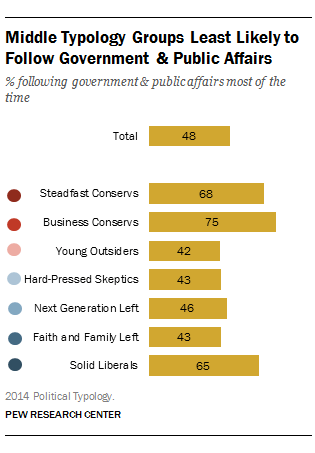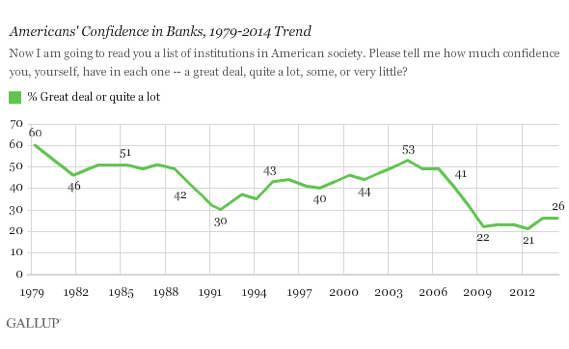
Two North Carolina polls bring good news for the Democratic incumbent. A massive study of political "typologies" finds divisions far beyond left, right and center. And the economic recovery has yet to restore Americans' confidence in banks. This is HuffPollster for Thursday, June 26, 2014
AMERICA, DIVIDED BY TYPOLOGY - Pew Research: "Even in an increasingly Red vs. Blue nation, the public’s political attitudes and values come in many shades and hues. Partisan polarization – the vast and growing gap between Republicans and Democrats – is a defining feature of politics today. But beyond the ideological wings, which make up a minority of the public, the political landscape includes a center that is large and diverse, unified by frustration with politics and little else. As a result, both parties face formidable challenges in reaching beyond their bases to appeal to the middle of the electorate and build sustainable coalitions." [Pew]
What's a typology? - Pew Research Director of Surveys Scott Keeter: "The goal of the political typology is to sort people into homogeneous groups, based on their political values and attitudes. It’s an effort to categorize people politically to help us better understand the complexities of the current political landscape...Political parties are one kind of grouping of like-minded people. But parties – at least in the U.S. – tend to be large agglomerations, with schisms and factions. Moreover, a growing number of people do not think of themselves in partisan terms, though they still have strong political views. Groups in the political typology may have a recognizable partisan tilt, but they are more internally consistent than the major U.S. parties...many of the groups who occupy the middle of the political spectrum contain a mix of Republicans and Democrats, and don’t necessarily correspond to organized groups in the political world. One reason for this is that politics is a peripheral concern for most people, especially for people who hold a mix of liberal and conservative views. The lack of interest in politics, as well as a sense of futility regarding the ability to influence political decisions, reduces the incentive to organize and act, even when a relatively large number of people may have similar political views." [Pew Research]
Why GOP needs to court disillusioned swing voters - Nate Cohn: "The report illustrates why Republicans will need to make inroads among competitive groups. The two Republican-leaning groups, 'Steadfast Conservatives' and 'Business Conservatives,' make up just 27 percent of registered voters, while three Democratic-leaning groups — 'Solid Liberals,' 'Next Generation Left,' and 'Faith and Family Left' — which roughly correspond to well-educated urban liberals, liberal millennials, and nonwhite voters, make up 47 percent of registered voters. The 'Hard-Pressed Skeptics' may hold the key to the short-term fortunes of the Republican Party....But these voters are not easy converts for the Republicans. Two-thirds say the government should do more to help the needy, even if it means going deeper into debt." [NYT]
CONSERVATIVE THINK TANK FINDS HAGAN EXPANDING LEAD - From a Civitas press release: "The latest Civitas Institute Poll shows Democratic incumbent Kay Hagan leading the Republican candidate, state House Speaker Thom Tillis, in the race for the U.S. Senate. Thirty-six percent of respondents picked Tillis, 42 percent favored Hagan, and 9 percent choose Libertarian candidate Sean Haugh. Asked to consider only the top two candidates, 43 percent choose Tillis, and 47 selected Hagan. The live-caller poll of 600 registered North Carolina voters took place June 18, 19 and 22, and had a margin of error of plus/minus 4 percentage points. Of respondents, 25 percent were contacted via cell phone."
[Civitas]
Second survey in June to show Hagan up - A Public Policy Polling (D) survey conducted in mid-June gave Hagan a 5-point lead over Tillis. The two results are the best for Hagan since the beginning of this year. HuffPost Pollster's tracking model currently gives Hagan a lead of about 3 points. [HuffPollster]

FEW AMERICANS TRUST BANKS - Rebecca Riffkin: "Twenty-six percent of Americans have 'a great deal' or 'quite a lot' of confidence in banks -- unchanged from last year, but up from the record low of 21% found in 2012. Americans' confidence in banks is still far below the pre-recession level of 41% measured in June 2007….Banks were at the epicenter of the financial crisis that has had a devastating effect on the U.S. economy, and therefore, on consumers. And even though the economy appears to be recovering slowly from the depths of the recession, the percentage of Americans expressing high confidence in U.S. banks has not." [Gallup]
HUFFPOLLSTER VIA EMAIL! - You can receive this daily update every weekday via email! Just click here, enter your email address, and and click "sign up." That's all there is to it (and you can unsubscribe anytime).
THURSDAY'S 'OUTLIERS' - Links to the best of news at the intersection of polling, politics and political data:
-Just 39 percent support renewed military action in Iraq, a level lower than other potential U.S. military actions in recent decades. [Gallup]
-Joe Lenski explains why the "generic ballot" question may be less predictive of the U.S. House seat count this year than usual. [NYTimes]
-Glen Bolger (R) estimates Republicans need 46 percent of women's votes to win. [POS]
-Elizabeth Wilner profiles 0ptimus, a rising Republican analytics and polling firm. [Cook Political]
-0ptimus explains the problems of using focus groups to test television advertising.[0ptimus via @kwcollins]
-Enjoy the graphics showing whether the U.S. would advance in the World Cup? Here's one for "How You Win A Baseball Game." [@Sky_Kalkman]

